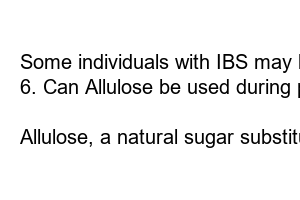알룰로스 부작용
Title: Unveiling Allulose Side Effects: What You Need to Know
Introduction:
Allulose, a low-calorie sweetener gaining popularity, has undoubtedly caught the attention of health-conscious individuals seeking alternatives to sugar. However, it’s crucial to be aware of any potential side effects that may arise from its consumption. In this blog post, we will delve into the subject, providing valuable insights into Allulose side effects and shedding light on the existing research surrounding this natural sugar substitute.
1. What is Allulose?
Allulose, also known as D-Psicose, is a natural sugar found in small quantities in certain fruits and foods. It possesses a remarkable ability to sweeten food and beverages without adding extra calories, making it an attractive option for those aiming to reduce their sugar intake.
2. Gastrointestinal Disturbances:
While Allulose is generally well-tolerated, excessive consumption has been known to cause gastrointestinal discomfort, including bloating, diarrhea, and flatulence. These symptoms may vary from person to person, and it is advisable to start with small amounts initially to determine individual tolerance levels.
3. Hypoglycemia Concerns:
Allulose has received attention for its potential to improve blood sugar control, particularly for individuals with diabetes or those following a low-carbohydrate diet. However, it’s essential to note that Allulose may result in low blood sugar levels (hypoglycemia) in some individuals. Therefore, it is crucial for people with diabetes or individuals susceptible to low blood sugar to monitor their levels closely.
4. Allergic Reactions:
While allergic reactions to Allulose are rare, a few isolated cases have been reported. Symptoms of an allergic reaction to Allulose may include itching, swelling, hives, or difficulty breathing. If you experience any of these symptoms, discontinue using Allulose and seek medical attention promptly.
5. Impact on Weight Loss:
Allulose’s low-calorie content and potential to improve blood sugar control have prompted interest in its role in weight management. However, it’s important to understand that Allulose, as a sugar substitute, should not be considered a magic ingredient for weight loss. It should be part of a balanced and healthy lifestyle, complementing other sustainable dietary and exercise practices.
6. Effect on Gut Microbiota:
A promising area of research is the impact of Allulose on the gut microbiota, the community of microorganisms residing in our digestive system. Preliminary studies suggest that Allulose may have a beneficial effect on gut health by selectively promoting the growth of beneficial bacteria. Nonetheless, more research is needed to draw definitive conclusions.
FAQs:
1. Can Allulose cause weight gain?
No, Allulose is a low-calorie sweetener and does not contribute significantly to weight gain when consumed in moderation.
2. Is Allulose safe for children?
Allulose is generally considered safe for children when consumed in appropriate quantities. However, it is advisable to consult a healthcare professional before incorporating it into a child’s diet.
3. Can Allulose be used in baking?
Yes, Allulose can be used in baking as a sugar substitute. It provides a sweet taste and contributes to achieving desired browning and texture in baked goods.
4. Does Allulose have an impact on dental health?
Compared to regular sugar, Allulose is less likely to contribute to dental decay. However, good oral hygiene practices, such as regular brushing and flossing, should still be maintained.
5. Is Allulose safe for individuals with irritable bowel syndrome (IBS)?
Some individuals with IBS may be more sensitive to Allulose and may experience gastrointestinal discomfort. It is recommended to monitor symptoms closely and consult with a healthcare professional.
6. Can Allulose be used during pregnancy?
While no adverse effects have been reported, it is advisable for pregnant women to consult their healthcare provider before using Allulose.
Summary:
Allulose, a natural sugar substitute, provides a lower-calorie alternative to traditional sugar. While generally well-tolerated, excessive consumption may cause gastrointestinal discomfort. Individuals with diabetes should monitor their blood sugar levels carefully. Allergic reactions are rare but can occur. Weight management benefits may result from Allulose, but it should not be considered a cure-all solution for weight loss. Research suggests potential benefits for gut health, although further studies are needed. When used correctly, Allulose can be a valuable addition to a healthy and balanced lifestyle.

